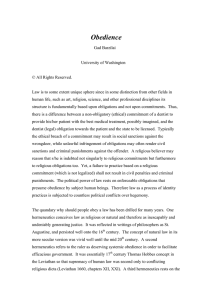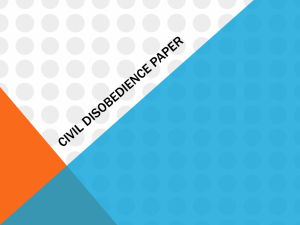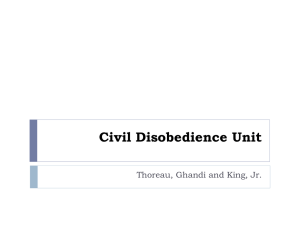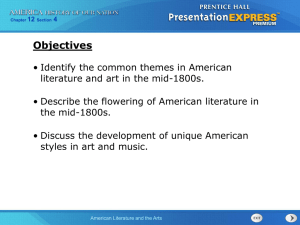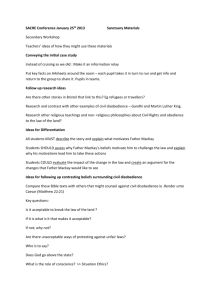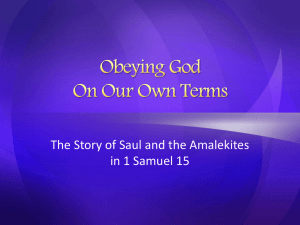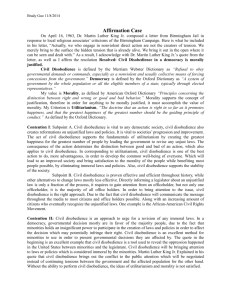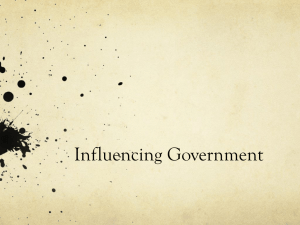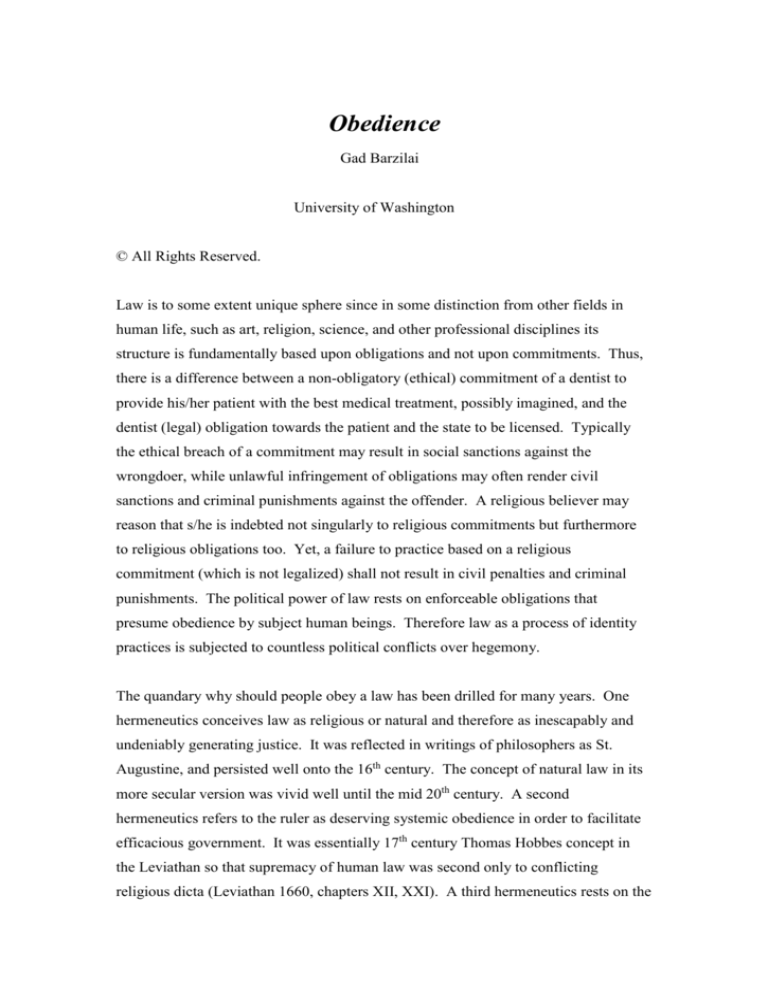
Obedience
Gad Barzilai
University of Washington
© All Rights Reserved.
Law is to some extent unique sphere since in some distinction from other fields in
human life, such as art, religion, science, and other professional disciplines its
structure is fundamentally based upon obligations and not upon commitments. Thus,
there is a difference between a non-obligatory (ethical) commitment of a dentist to
provide his/her patient with the best medical treatment, possibly imagined, and the
dentist (legal) obligation towards the patient and the state to be licensed. Typically
the ethical breach of a commitment may result in social sanctions against the
wrongdoer, while unlawful infringement of obligations may often render civil
sanctions and criminal punishments against the offender. A religious believer may
reason that s/he is indebted not singularly to religious commitments but furthermore
to religious obligations too. Yet, a failure to practice based on a religious
commitment (which is not legalized) shall not result in civil penalties and criminal
punishments. The political power of law rests on enforceable obligations that
presume obedience by subject human beings. Therefore law as a process of identity
practices is subjected to countless political conflicts over hegemony.
The quandary why should people obey a law has been drilled for many years. One
hermeneutics conceives law as religious or natural and therefore as inescapably and
undeniably generating justice. It was reflected in writings of philosophers as St.
Augustine, and persisted well onto the 16th century. The concept of natural law in its
more secular version was vivid well until the mid 20th century. A second
hermeneutics refers to the ruler as deserving systemic obedience in order to facilitate
efficacious government. It was essentially 17th century Thomas Hobbes concept in
the Leviathan so that supremacy of human law was second only to conflicting
religious dicta (Leviathan 1660, chapters XII, XXI). A third hermeneutics rests on the
presumed communal nature of a society that empowers a certain agent, be it the
legislative or the executive body, to govern through a rule making. John Locke in his
Second Treatise of Civil Government (1690, chapter XIII) is a prominent thinker in
that tradition as was shaped during the 17th century. A fourth hermeneutics, mainly
developed by Karl Marx (1843/1975, 1852/1976), conceives law as an
epiphenomenon constructed by the bourgeoisie and for that reason subjected to
legitimate disobedience. A fifth hermeneutics that was mainly articulated since the
18th century, presumes that the intrinsic logic of law is embedded in the desired
necessity of a society to exist. There is no individual autonomous virtue of forming
and obeying obligations. People obey in practice and should obey as a social sine qua
non condition to generate a durable society (Hume, 1739). David Hume (1739),
Immanuel Kant (1785), Max Weber (1914), John Rawls (1971, 1999) and Joseph Raz
(1977, 2001) are models of that tradition, which presumed that laws should primarily
be obeyed, as a sine qua non to existence of society, while disobedience is lawful only
as an exception.
Nonetheless, disobedience is not necessarily unlawful and the dilemma under what
conditions people should disobey law has been drilled for many years, as well. To
presume that law in democracy should be obeyed under all circumstances, since it
reflects a majority rule, significantly questions the ability of minorities to resist law.
A law may severely infringes their human rights, notwithstanding ratified by the
majority, which often controls all branches of government, including the legislative
and the judiciary. Is it not valuable for a democratic existence to prefer disobedience
over violence under conditions of systemic discrimination? Alternatively, if
disobedience is in principle legally recognized, what are its boundaries in
contemporary democracy?
One normative scenario contends that disobedience is permissible once there is not a
necessity in enforcing a law. Such a statement may lead to chaotic disobedience to
laws since most people will never concur on what is a ‘necessity’ unless submitting
themselves to authority. Hence, while most political thinkers admit that some
disobedience in democracies is legitimate they disagree as to which conditions make
it legal. Disobedience should be bounded in its normative and practical scope, and the
query is what should be its boundaries? The problems with possible contemporary
interpretations are crucial. Is disobedience to a secular state law is justified once a
religious law is not enforced? Since invariably in all democracies secular state law
surpasses religious law, in some matters, at least, the option of religious disobedience
may be an acute issue. Thus, should polygamy be legalized? A minimal age for
marriage annulled? Is disobedience of law that prohibits using religious symbols in
public sphere is legal? (Barzilai 2003, 2004).
It is undesirable to formulate one single deontologist and consequential rule according
to which obedience is always lawful and disobedience is always illegal. There is no
desired deontologist and consequential opposite rule, as well. Ontologically, a
democratic criterion for disobedience is that law may be justly and legally disobeyed
in context in which it severely infringes irrecoverable damage to basic needs and
human rights, and once the aforesaid (potential) damage is not absolutely necessary
for the protection of other community members’ basic needs and human rights. Thus,
higher taxes imposed on deprived people; a preventive war for aggressive purposes;
an abolishment of a religious faith; are only a few examples to instances in which
disobedience should be legally permissible in a democracy, if no other democratic
avenue of political participation for changing a bad law is effectively accessible to the
public.
Not all cases of conflicts between particularistic needs and obligations justify
disobedience. Disobedience is a democratic and legitimate principle, its legalization
in specific instances, however, should be politically and constitutionally calculated
within a broader perspective of various options for well being and political behavior
in a democracy. The lawfulness of disobedience is dependent on the gravity of the
damage that it supposes to evade and hamper, and if no the other political means as
parliamentary struggles and adjudication may be practically and effectively available.
Furthermore, disobedience is even desirable once the damage to basic human needs
and rights is unrecoverable through any foreseeable mode of political participation.
The power of law in democracies is embedded in its willingness and ability not only
to enforce obligations but to be responsive in matters in which obligations are
suspended and when disobedience should be decriminalized and lawful.
Further Readings:
Barzilai, Gad. 2003. Communities and Law: Politics and Cultures of Legal
Identities (Ann Arbor: University of Michigan Press).
Barzilai, Gad. 2004. “The Redemptive Principle of Particularistic Obligations: A
Legal Political Inquiry.” The Responsive Community. 14 (2-3): 133-137.
Gans, Haim. 1992. Philosophical Anarchism and Political Disobedience.
Cambridge: Cambridge University Press.
Hobbes, Thomas. 1660. Leviathan. Also:
http://oregonstate.edu/instruct/phl302/texts/hobbes/leviathan-contents.html
Hume, David. 1739. A Treatise of Human Nature.
Also: http://www.engl.virginia.edu/enec981/dictionary/09humeC2.html
Kant, Immanuel. 1785. The Metaphysics of Morals.
Lock, John. 1690. Second Treatise of Civil Government.
http://www.marxists.org/reference/subject/politics/locke/ch13.htm
Marx, Karl. 1843/1975. “On the Jewish Question”. In Marx’s Early Writings, edited
Lucio Colletti. London: Penguin.
Marx, Karl. 1852/1976. “The 18th Broumaire of Louis Bonaparte”. In Marx and
Engels Collected Works. London: Lawrence and Wishart.
Rawls, John. 1971. A Theory of Justice. Cambridge: Harvard University Press.
Rawls, John. 1999. The Law of Peoples. Cambridge: Harvard University Press.
Raz, Jospeh “Promises and Obligations” in Raz Joseph and Hacker M.S (eds.). 1977.
Law, Morality, and Society. Oxford: Clarendon.
Raz, Joseph. 2001. Engaging Reason: On the Theory of Value and Action. Oxford:
Oxford University Press.
Waltzer, Michael. 1970. Obedience: Essays on Disobedience, War and Citizenship.
Cambridge: Harvard University Press.
Weber, Max. 1914/1963. Economy and Society, vol. II, eds. G. Roth and W. Wittich.
Los Angeles: UCLA Press.

